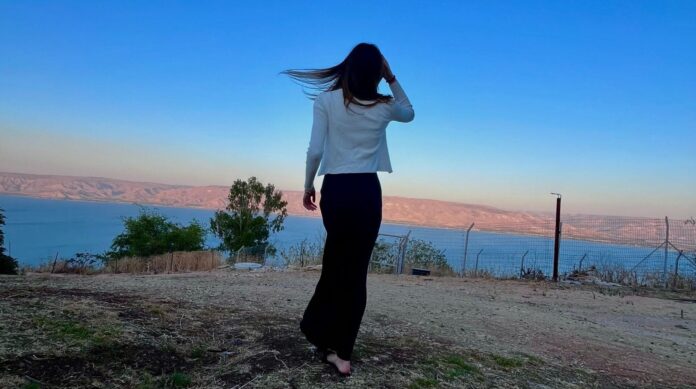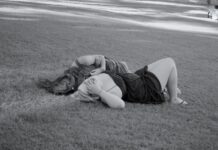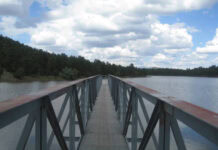It was erev Shemini Atzeret1. I was nine. The house was abuzz with the usual chaos of Yom Tov2 preparation, but an additional level of stress hung thick in the air. Hushed, concerned conversations filled every moment not already occupied by cooking and cleaning.
The strain rose into a cyclone of tension and concern, all spiraling around the chair where my father sat, unnaturally stiff and upright, his face taut with pain.
About an hour before candlelighting for the holiday, my mom drove my dad to the Emergency Room.
My dad had experienced abnormally intense pain for a few weeks, which had grown steadily more extreme. Today, it had peaked into something so excruciating he could no longer even pretend he just needed to take a Tylenol and get some rest. We could no longer ignore the problem.
That evening was surreal. It was dreamlike, uncanny. Every moment was filled with a dark emptiness, the frightening void my parents left behind. I was waiting to wake up from a nightmare, but even today the dream has not faded away to wakefulness.
My oldest siblings and I brought in Yom Tov alone, lighting candles alone and sharing a silent dinner that felt anything but festive.
I don’t think I fully understood. My nine-year-old, selfish instincts told me it couldn’t be serious. I was at a stage where I thought sickness didn’t get much worse than the flu. Words like cancer and chemotherapy were associated with elderly relatives, connected to funerals and other people’s lives. Words like fracture and hospital might come up after a terrible accident, but there hadn’t been any such catastrophe. My dad hadn’t been hit by a car, hadn’t fallen down the stairs or slipped on the ice. He’d just gone through day after deceptively normal day silently, praying the growing agony inside his back would simply fade away. I lived in a comfortable state of deception, convinced my family was immune to the horrors the rest of the world could experience.
That was the last day I lived in that realm of innocence.
I remember the morning of Shemini Atzeret. I woke up before any of my siblings and went downstairs to find my mom had returned from the hospital, her eyes rimmed with heavy dark circles. She told me my dad had a fractured vertebra, but that they had to run a series of tests to identify the cause. Vertebrae don’t just snap on their own, after all. She’d returned home to check on us kids and deliver the news but was about to leave for the hospital to return to his side.
I was scared, yet I still held only a small fraction of an idea of what was going on. No one knew yet what was coming, me least of all.
Throughout the day, we waited with bated breath for the return of my mother and the results of the MRI. She came back, hugged us all, delivered the newsless news that the results weren’t back yet, and left again. Us kids floated through the day, each trapped in our private reveries while trying uselessly to pretend things were normal for each other’s sake.
That evening was Simchat Torah3. Every year, my family goes to Simchat Torah services, dancing long into the night. I’d run to the men’s side of the mechitza4, where father would scoop me up each year despite my growing size, parading around with me riding gleefully on his shoulders feeling like the queen of the world. On the women’s side, my mother would take my hands, spinning me around until I’d topple to the synagogue floor, laughing and dizzy.
But this year… What would Simchat Torah mean? How would a holiday so intrinsically dedicated to celebration be possible with so much fear and uncertainty floating in the air?
At my father’s urging from the hospital bed, we attended services and hakafot5 anyway.
For the first time ever, I learned my dad’s Hebrew name and his mom’s Hebrew name so we could recite a misheberach, the prayer for a sick person. Shmuel Natan ben Avra Yaakova. Or to me, Abba, son of Bubby. Before my dad got sick, I’d always thought of the misheberachs as applying only to other families. Once again, I was awakened rudely to the understanding that my family wasn’t special; we were not immune. That name would become ingrained in me, ringing in my ears every single week as my entire family and synagogue prayed for him more times than I can count.
Simchat Torah is a joyous holiday, filled with song and dancing. That year, dancing felt like the hardest thing I’d ever done. I almost resented the joyful abandon of the rest of the congregation. I wondered whether I had a right to celebrate while my father lay in a hospital bed, waiting for the results of scans. Still, though, I joined hands with everybody, and I felt their joy seep into my own soul. I let the energy of the congregation almost sweep me off my feet. I sang the songs I knew by heart and clapped along with the ones I couldn’t remember the lyrics to. The tunes wrapped their warm arms around me, and I felt safe in the hands of my community.
Over the next several days, my perspective on the world changed. My thoughts reached depths they’d never even approached. I felt emotions I didn’t even know the names for, shaking me to my core.
Information flooded in. My father’s bone marrow was weakened by diffuse large B-cell lymphoma, a form of cancer, which had ultimately caused a vertebra to break. It was stage four cancer. I understood that with an approximately 55% survival rate, the treatment wouldn’t necessarily work.
I picture that Simchat Torah as marking the moment the Tova from before fled, and the new Tova took over. When the Torah scroll was rolled back to the beginning at the front of my synagogue, the new Tova experienced a beginning of her own. A level of maturity I hadn’t had before swept in as I became increasingly in touch with the brutal reality of the world. My bubble of presumption popped forever.
Years later, my father is in remission. I can only hope and daven6 for him to stay there.
As he hikes through the blurry lines of recovery, I find myself navigating my own maze. A labyrinth of mental remission.
There is no timeline to measure rehabilitation after such deep fear. My father has lost an inch or so of height from the degradation of bone marrow in his spine. He’ll never gain that height back. A literal part of himself has been taken from him. In a less literal way, part of me has been eaten away by terror, and I may never be able to regrow it, never reach an official all-clear, just like there’s never a total all-clear for cancer.
I’m writing these words just three days before another Simchat Torah. I’m readying myself for the conflicting emotions I inevitably feel going into the holiday. The trauma of the tragic events of October 7th occurring over Simchat Torah has only added to the painful memories I relive every year. At the same time, though, I’m filled with a staggering gratitude to be able to start another cycle of the Torah together. I’m ready to come together with my community, each of us scarred by the losses our families and community have faced. I’m comforted by the knowledge that despite the pain we each feel on Simchat Torah, we will still join hands and let the joy and pain blur together into something beautiful.
This Simchat Torah, my father will be dancing. For me, that alone is worth celebrating.
- The holiday that marks the end of Sukkot. ↩︎
- A holiday when many Jews abstain from working, cooking, and using electricity, among other restrictions. ↩︎
- A holiday that celebrates the annual completion of the reading of the Torah. ↩︎
- A partition separating men and women. ↩︎
- A practice of dancing in circles with the Torah scrolls. ↩︎
- pray ↩︎
Join the conversation!





